Speech by President Emomali Rahmon at the Side Event «Roadmap for 2025: International Year of Glaciers’ Preservation»
Read also
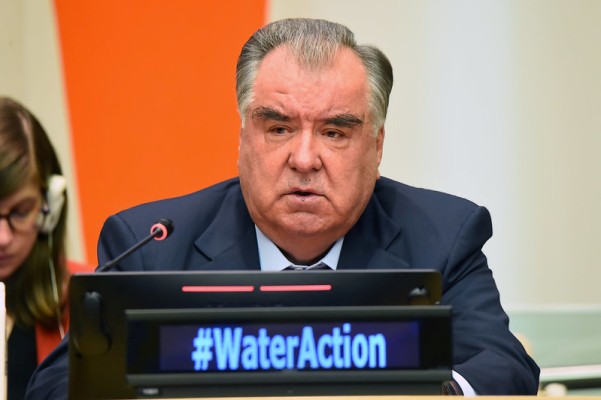
22.03.2023, United States
Excellency UN Secretary-General,
Distinguished participants,
Ladies and gentlemen,
At the outset, I would like to welcome you to this side event «Roadmap for 2025: International Year of Glaciers’ Preservation». Taking this opportunity, I would also like to express my gratitude to our partners — UNESCO, World Meteorological Organization and the World Bank for their fruitful cooperation in convening this event.
Today’s event is the first step towards the implementation of the new resolution of the United Nations declaring the 2025 as the International Year of Glaciers’ Preservation. The goal of this gathering is primarily to unite the efforts of various parties to make this initiative successful and effective.
I believe that fruitful dialogues and discussions within the framework of this event will contribute to defining a common vision and developing a road map for 2025. This conference will also serve to develop a joint commitment of the parties on the issue of concern and incorporate it into the Water Action Agenda as our decent contribution to the results of this historic Conference.
Dear friends,
You are aware that we presented this initiative in 2021 at the first meeting of the Water and Climate Coalition. The main reason for proposing this move is the issue of rapid melting of glaciers, which is becoming more and more important every year, and the continuation of this process endangers the future of mankind.
According to the Intergovernmental Panel on Climate Change Report on Oceans and Cryosphere (2019), one third of the world’s glaciers may disappear by the end of this century. In the last 50 years alone, more than a thousand glaciers have completely melted in Tajikistan, and the total volume of the country’s glaciers has decreased by about a third.
According to the conclusions of experts, the last three years have been the hottest years in the entire period of meteorological observations in the world.
It is clear that the continuation of this process may lead to unpleasant consequences given the rapid increase in water demand due to population growth and economic development.
The water availability per capita indicator has already declined by two and a half (2.5) times globally, and by four times in the Central Asian region in the last five decades. In addition, the melting of the Arctic and Antarctic glaciers has caused an increase in the level of ocean, which threatens the life and well-being of hundreds of millions of inhabitants of the Earth, especially in small island countries. This all is a very serious concern.
Dear participants,
Indeed, the melting of glaciers is a very serious process that cannot be prevented by convening events within a year or even several years. Greater, sustained and concerted efforts are needed, including on prevention of global warming, in order to slow the rate of glacier melt. The objective of our proposal to declare the Year of Glaciers’ Preservation is to draw the attention of the international community to this critical issue and to unite efforts to take decisive measures to eliminate this process, and to ensure the resilience of societies and the economies affected by it.
We expect that the United Nations General Assembly resolution on this issue will provide a favorable ground to promote this process. It is worth mentioning that this resolution defined March 21 as the World Day of Glaciers. With this in mind, starting in 2025, the world will celebrate three days in a row from March 21 to 23 that are related to water, namely Day of Glaciers, Water Day and Meteorology Day. In accordance with this resolution, a special fund will be established to support activities related to the preservation of glaciers, which can mobilize financial resources from various sources to carry out the necessary actions and implement the goals.
According to the United Nations resolution, the Republic of Tajikistan will host the International Conference on Glaciers’ Preservation in 2025. We express the full readiness of our country to convene this international conference at a high level, and invite the UN member states and other stakeholders for cooperation in this area. It is worth noting that this move is coherent with the initiative of the Honorable UN Secretary General on early warning system for all by 2027, and ensuring coordination and close cooperation in their implementation would lead to better outcomes.
We are of view that, together with the countries and stakeholders, we will develop the Roadmap for 2025 and start a comprehensive and effective preparation process for the 2025 and the aforementioned Conference. I believe that the experience and resources of UNESCO and the World Meteorological Organization, which are responsible for the implementation of the Year of Glaciers’ Preservation according to the resolution, will fully contribute to the effective implementation of its goals.
From our point of view, the World Bank, the International Atomic Energy Agency (IAEA), the International Union for Conservation of Nature, the Water and Climate Coalition and other partners can also contribute to the success of this initiative. Indeed, the Dushanbe Water Process platform will provide the ground and favorable environment for running dialogues and discussions in this area.
I am sure that our joint efforts in this area will bear the expected outcomes and we will be able to make serious transformations in addressing this important issue on the sidelines of the International Conference on Glaciers’ Preservation in 2025 in Tajikistan.
I wish all of us good luck in achieving this goal, and I invite for fruitful cooperation hereby.
I thank you for your attention!











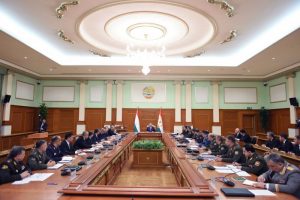 President Emomali Rahmon Holds Security Council meeting
President Emomali Rahmon Holds Security Council meeting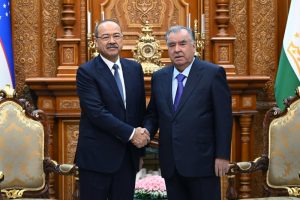 President Emomali Rahmon Receives the Prime Minister of the Republic of Uzbekistan Abdulla Aripov
President Emomali Rahmon Receives the Prime Minister of the Republic of Uzbekistan Abdulla Aripov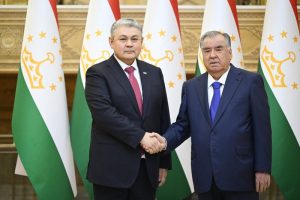 President Emomali Rahmon, Received the Minister of Foreign Affairs of the Republic of Kazakhstan
President Emomali Rahmon, Received the Minister of Foreign Affairs of the Republic of Kazakhstan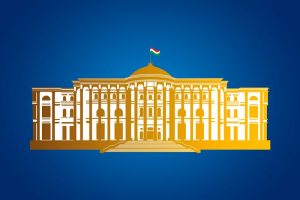 President Emomali Rahmon Enacts New Laws
President Emomali Rahmon Enacts New Laws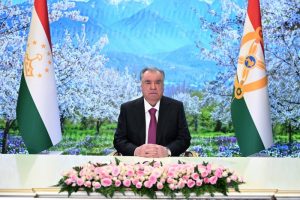 President Emomali Rahmon Sends Festive Greetings to President Xi for Chinese New Year
President Emomali Rahmon Sends Festive Greetings to President Xi for Chinese New Year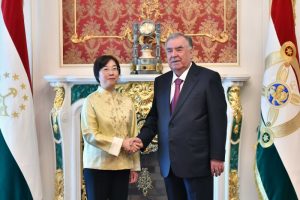 President Emomali Rahmon Receives AIIB President Zou Jiayi in Dushanbe
President Emomali Rahmon Receives AIIB President Zou Jiayi in Dushanbe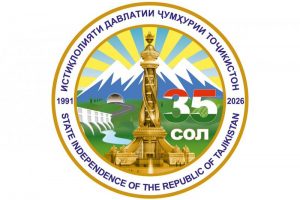 President Emomali Rahmon Approves Emblem for the 35th Anniversary of Tajikistan’s State Independence
President Emomali Rahmon Approves Emblem for the 35th Anniversary of Tajikistan’s State Independence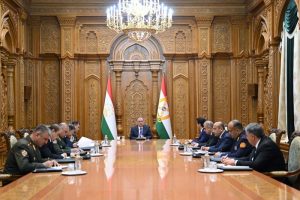 President Emomali Rahmon Holds Working Meeting with Heads of Security and Law Enforcement Agencies
President Emomali Rahmon Holds Working Meeting with Heads of Security and Law Enforcement Agencies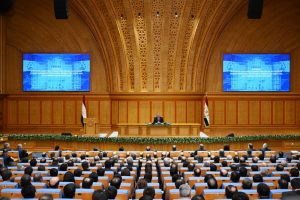 Expanded meeting of the Government of the Republic of Tajikistan
Expanded meeting of the Government of the Republic of Tajikistan














